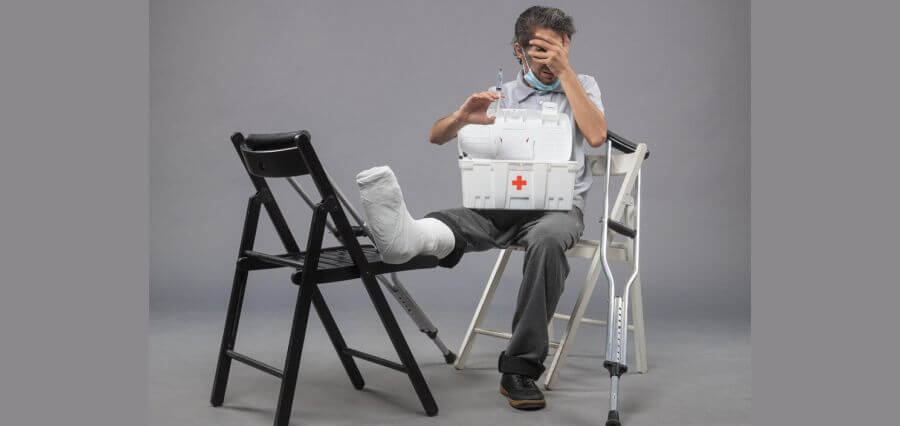Personal injuries can happen unexpectedly, leaving you in a state of confusion and stress. Knowing the right steps to take immediately following an alleged personal injury is crucial for both your health and potential legal claims. Whether the injury occurred in a car accident, slip and fall, or workplace incident, following a structured approach can help you manage the aftermath effectively. Consulting a personal injury attorney in Norfolk early in the process can ensure your rights are protected and you receive the compensation you deserve.
1. Seek Medical Attention Immediately
Immediate Medical Care
Your health should be your top priority. Even if you think your injuries are minor, it’s essential to seek medical attention immediately. Some injuries may not show symptoms right away, and a medical professional can diagnose and document any hidden issues. Timely medical care also provides official documentation of your injuries, which is critical for any future legal claims.
Follow-Up Appointments
Ensure you attend all follow-up appointments and follow the medical advice given. This not only aids your recovery but also provides continuous documentation of your injuries and treatments, which is vital evidence in personal injury cases.
2. Document the Incident
Collect Evidence
Gather as much evidence as possible from the scene of the incident. This includes taking photographs of the accident site, your injuries, and any contributing factors such as slippery floors or defective equipment. Collect contact information from witnesses who can provide statements about what happened.
Write a Detailed Account
Write down a detailed account of the incident as soon as possible. Include the date, time, location, and circumstances leading up to the injury. Your memory of the event will be freshest immediately after the incident, and this documentation can be crucial for your case.
3. Report the Incident
Notify Authorities
Depending on the nature of the injury, you may need to report the incident to the relevant authorities. For car accidents, this means calling the police to file a report. For workplace injuries, notify your supervisor and ensure the incident is documented according to your employer’s procedures.
Obtain Copies of Reports
Request copies of all official reports related to the incident. These documents provide an authoritative account of the incident and can be used as evidence in your claim.
4. Avoid Making Statements
Be Cautious with Communication
Be cautious about what you say to others about the incident. Avoid discussing fault or making detailed statements to insurance companies without legal advice. Insurance adjusters may use your statements against you to minimize their liability.
Consult Your Attorney First
Before providing any statements or signing any documents, consult with a personal injury attorney in Norfolk. They can guide you on how to handle communications to protect your interests.
5. Contact a Personal Injury Attorney
Early Legal Advice
Contacting a personal injury attorney in Norfolk as soon as possible is crucial. An attorney can provide valuable advice on how to proceed, ensuring that you meet all legal requirements and deadlines. Early legal intervention can also help preserve evidence and build a stronger case.
Case Evaluation
An experienced personal injury attorney will evaluate your case, explaining your rights and potential compensation. They can also advise you on whether to pursue a settlement or take your case to court.
6. Manage Your Case Diligently
Keep Detailed Records
Keep detailed records of all medical treatments, expenses, and any other costs related to your injury. This includes bills, receipts, and any correspondence with insurance companies. Organizing these documents can streamline the process of filing a claim and ensure you are fully compensated.
Follow Your Attorney’s Advice
Follow your attorney’s advice closely throughout the process. They have the expertise to navigate the legal system and will guide you in making informed decisions about your case.
FAQs
1. What should I do immediately after an injury?
Immediately after an injury, seek medical attention, document the incident, and report it to the relevant authorities. Contact a personal injury attorney in Norfolk for legal advice.
2. How can a personal injury attorney help me?
A personal injury attorney can provide legal guidance, help gather evidence, negotiate with insurance companies, and represent you in court if necessary. They ensure that you receive fair compensation for your injuries.
3. How soon should I contact a personal injury attorney?
Contact a personal injury attorney as soon as possible after the incident. Early legal intervention can help preserve evidence and meet all legal deadlines.
4. What if I can’t afford a personal injury attorney?
Many personal injury attorneys work on a contingency fee basis, meaning they only get paid if you win your case. This allows you to access legal representation without upfront costs.
Final Thoughts
Taking the right steps immediately after an alleged personal injury can significantly impact the outcome of your case. Seeking medical attention, documenting the incident, reporting it to the appropriate authorities, and contacting a personal injury attorney in Norfolk are all critical actions that can help protect your rights and ensure you receive the compensation you deserve. By following these guidelines, you can navigate the aftermath of a personal injury with confidence and legal support.


